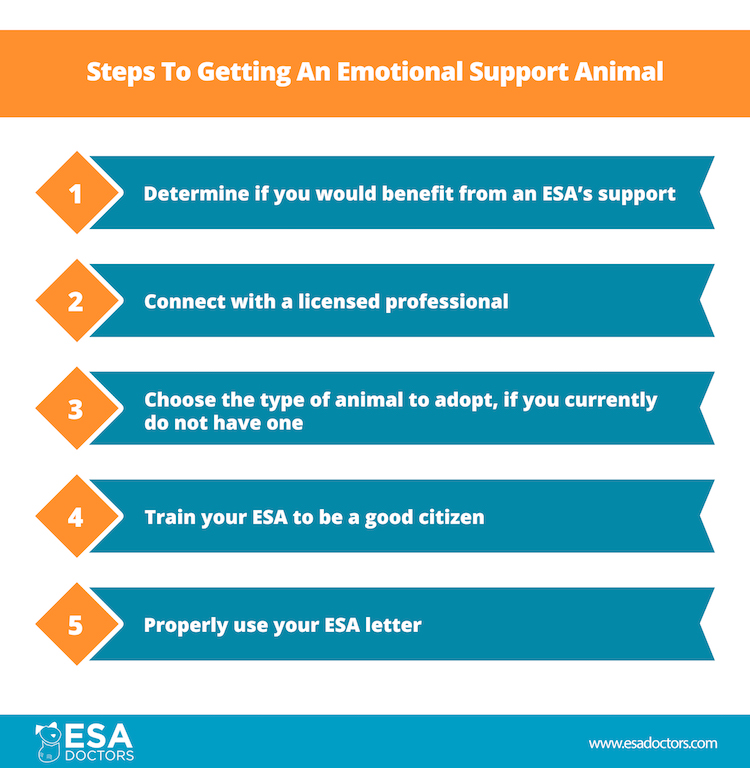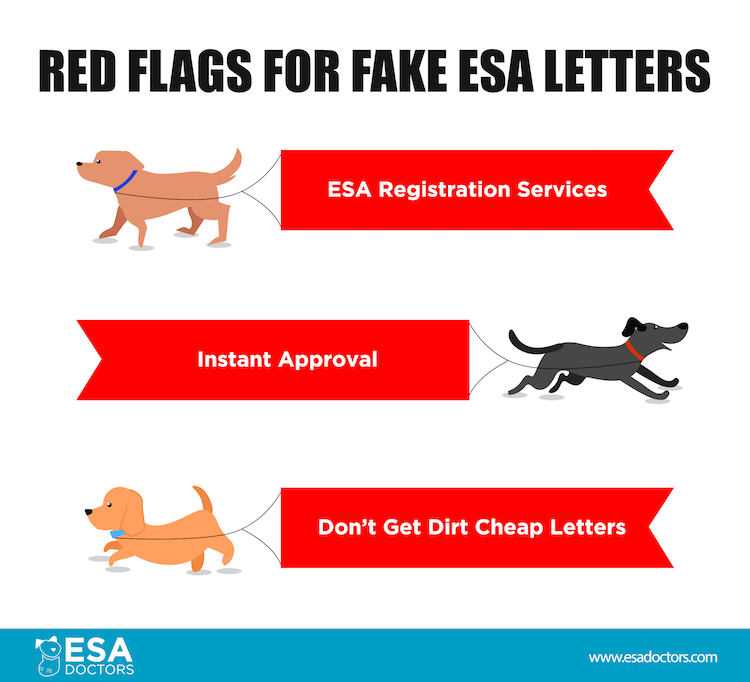Florida recently passed new laws governing emotional support animals (ESA) which go into effect on July 1, 2020. These new laws clarify how residents of Florida can properly qualify for an emotional support animal and affirm the special rights ESA owners have. These rules were also intended to address a growing concern that tenants are purchasing illegitimate documentation for emotional support animals and wrongly passing off their pets as emotional support animals. The new rules set forth how tenants can obtain effective ESA documentation, including through a telehealth provider.
In this article, we will summarize key points from the new Florida emotional support animal law and examine what steps current and prospective ESA owners should take in order to comply. Under the new law, residents of Florida who falsely claim their pet is an emotional support animal without following the correct procedures may be subject to legal liability and penalties. Now more than ever, it is important to understand your rights as an ESA owner and obtain your ESA documentation from a reputable source.
If you’re looking to qualify for ESA documentation in Florida, ESA Doctors can help connect you to a licensed health care professional that can assess whether an emotional support animal is right for you.
Protections for Florida Tenants who Own Emotional Support Animals
The new rules in Florida are similar in many ways to Federal Fair Housing rules for emotional support animals and borrow many of the same concepts. An emotional support animal in Florida is an animal that provides assistance or therapeutic emotional support to its owner by its mere presence. An ESA does not need any special training to work or perform tasks for its owner.
Florida’s laws prohibit housing providers from discriminating against tenants with a need for an emotional support animal. ESA owners are allowed to live with their animal companions as “reasonable accommodation”, even in buildings that generally prohibit pets. Landlords are also not permitted to charge extra compensation for allowing the animal, meaning they cannot charge a fee or pet deposit for ESAs.
Housing providers in Florida must generally accept a valid request from a tenant to live with their emotional support animal, with certain exceptions. A landlord can deny a reasonable accommodation request for an ESA that poses a direct threat to the health or safety of others or poses a direct threat of damage to property, but only if those threats cannot be reduced or eliminated by another reasonable accommodation.

How to Qualify for an Emotional Support Animal in Florida
Qualifying for an emotional support animal under Florida law is similar to the procedure under federal Fair Housing rules. Generally, owners of emotional support animals have invisible disabilities such as depression, anxiety, PTSD or phobias. A tenant can prove that they have a disability related need for an emotional support animal by submitting an ESA recommendation letter from a licensed health care practitioner to their landlord.
A wide range of health care practitioners are permitted to provide ESA letters in Florida, including:
- psychologists
- mental health counselors
- marriage and family therapists
- social workers
- psychiatrists
- doctors
- registered nurses
- and other licensed professionals.
Telehealth providers who provide their services remotely are also permitted to provide ESA documentation.
In addition to being allowed to ask for an ESA letter from a licensed provider, landlords are also permitted to request proof of compliance with state and local requirements for licensing and vaccination of the ESA. An emotional support animal is not exempt from general licensing and vaccination rules that generally apply to all animals in the tenant’s jurisdiction.
Similar to Fair Housing rules, owners with emotional support animals have certain rights to privacy when it comes to sensitive, confidential details about their medical condition. Landlords are not permitted:
- to request information that details the diagnosis or severity of the tenant’s disability, and
- they cannot request any medical records relating to the tenant’s disability.
The new rules in Florida also address landlords that create unnecessary barriers for tenants who request ESA accommodation. Under the new rules, housing providers cannot require the use of a specific form or a notarized document. Landlords also cannot deny an ESA request solely because the tenant did not follow the landlord’s routine procedure for ESA accommodations.
That means that landlords must consider an ESA request if the tenant submits valid ESA documentation from their health care practitioner. They cannot further insist that the tenant submit additional forms or follow a different procedure if the tenant has otherwise complied with ESA rules.

Invalid Forms of ESA Documentation in Florida
Like the recent guidelines issued by the U.S. Department of Housing, the new law in Florida attempts to curb the spread of inadequate forms of ESA documentation. In Florida, registrations, identification cards, patches, certificates or similar registrations obtained online will not by themselves be sufficient to establish the tenant has a disability-related need for an emotional support animal.
Florida’s ESA rules make clear that in order to have a valid emotional support animal, the tenant must possess documentation from a licensed health care practitioner.
All prospective ESA owners should understand that a mere certificate, ID or registration bought online will not be enough to properly qualify their animal companion as an ESA.
If you do not currently have a licensed health care professional familiar with your mental health, or you are having difficulty finding one, ESA Doctors can help connect you to a licensed practitioner. The practitioners we work with are licensed professionals who are knowledgeable about emotional support animals. They can help evaluate whether an ESA is right for you and, if you qualify, can provide you with documentation to submit to your landlord.

Consequences for Faking the Need for an Emotional Support Animal
In Florida, it is now more important than ever to ensure that your ESA documentation is from a licensed health care practitioner. The new law in Florida contains penalties for tenants who knowingly provide fraudulent documentation for an emotional support animal. Providing fake documentation in Florida is punishable as a misdemeanor offense.
It is never a good idea under any circumstance to provide fake documents for an emotional support animal. Misrepresenting your pet as an assistance animal is unethical and harms the reputation of the community of emotional support animal owners who obtain their documents from reliable sources. In Florida, presenting illegitimate ESA documentation may now result in potential legal consequences as well.
If you are interested in qualifying for an emotional support animal in Florida, make sure you are being evaluated by a licensed health care professional. The new rules in Florida make clear that solely presenting a certification, registration or ID is not sufficient to qualify an emotional support animal. It is important for ESA owners to be aware that these documents and accessories are not enough to make a valid claim for reasonable accommodation of an ESA.
Current and prospective ESA owners in Florida should possess a valid ESA recommendation letter from a licensed professional before requesting ESA accommodation from their housing provider. If you are interested in qualifying for an ESA in Florida, ESA Doctors can help connect you to a licensed healthcare professional that is knowledgeable about emotional support animals.
Improve your life. Connect with a Licensed Health Care Professional now.








Can a hotel in Florida charge a fee for an ESA?
ESAs do not have rights in hotels, so the hotel would be free to have any policy regarding the animal that they like. Service dogs are the only assistance animals that have rights in hotels.
I work at a restaurant and had a guest come in with a support dog. They explained that they get seizures and the dog is able to notify them before it happens. Do they have the same rights as a service dog.
Support dogs do not have public access rights, but it sounds like they may have had a service dog if it was trained to perform a task that assists a disability.
Correct. As long as you have a registered Esa, or service Animal, they cannot ask for for any more than a certficate
To clarify, you do NOT need a registration or a certificate for an ESA or service dog. ESAs require ESA letters while service dog owners must have a qualifying disability and a properly trained dog that assists with their disability. Please see this link for more info about how ESA qualification works: https://esadoctors.com/esa-letter/
If I am moving from Puerto Rico to Florida and have done the documentation for my ESA, do I need to go through the same process again and find a letter from a provider licensed in Florida?
Some landlords are willing to accept out of state ESA letters, but some will insist on a letter from a Florida licensed therapist. If you need a Florida licensed healthcare professional to evaluate you for an ESA letter, you can get started here: https://esadoctors.com/esa-questionnaire/
If your pet is a registered ESA, and you buy a condo in FL, are you limited by the HOA weight restrictions on dogs?
ESAs are not subject to weight restrictions. You also do not need to register an ESA – the only documentation you need is a signed letter from a licensed healthcare professional.
Does the emotional service animal need to be the direct owner of of the individual in need or can it be a family member as well
A person qualifies for an ESA by having an ESA letter that is personal to them. Please see this link for more information: https://esadoctors.com/ask-doctor-emotional-support-animal-letter/
Does this apply to airbnb rentals that explicitly state “no pets,” since an ESA is not a pet?
A short-term Airbnb rental is not likely to qualify as housing subject to Fair Housing rules, it is likely more akin to a hotel stay and ESAs do not have legal rights in hotels.
Can a land lord require you to pay for pet policy for your ESA in your monthly renters insurance?
There is no specific guidance on this but it could be construed as a backdoor way to have the tenant pay an additional charge just because they need an ESA.
I went to the apartment complex office to register my Emotional Support Animal and they are telling me that I have to neuter my animal. According to my lease, there is nothing stating that my emotional support animal, or any regular animal for that matter, must be spayed/neutered. Management at the apartment complex says it has always been the policy but it is not on the lease saying it is required. Not even on their online website does it say it is required. It actually says “not required” next to the question if the animal has to be spayed/neutered. Then, as I’m emailing the manager, it is as if she’s threatening me when she told me “I am not going back and forth with you. Everything has been explained on how to proceed or what happens if you don’t. The rest is up to you.” Now, if I were to speak my mind and say what I wanted to back to her, I’d be evicted. So I left it at that and haven’t responded since. What can I do about that?
We can’t advise you on what exactly to do, but we can say that in our experience it is highly unusual for a landlord to demand that a tenant neuter their emotional support animal.
If my 8 week old 4# puppy was approved as a reasonable accommodation by my HOA, can they limit his potty area to a spot 2 blocks away where many unknown dogs go while I am waiting for him to be fully vaccinated against parvo and rabies, etc.? My vet has advised he should not go to the complex’s common potty area until he is fully vaccinated if I can’t be sure of the vaccination status of the other dogs using the area for our 18-building complex. There is a small patch of grass at the end of our building’s parking lot where no one walks or traverses there at all, and no other dogs relieve themselves? It would not negatively impact any resident for this short period of time (approximately 3 weeks).
Thank you!
We can’t say there’s a clear cut answer for your situation. Landlords are required to provide reasonable accommodation for ESAs – whether it’s reasonable to have an ESA relieve itself 2 blocks away from the apartment is debatable. Our suggestion is having a discussion with your landlord about whether any further accommodations can be made for you.
You should call / report them to HUD. If it’s a real ESA you can’t be evicted for having it, period. I would report them so there’s a paper trail and documentation that they are in violation of federal and state laws. It sounds like they need their hands slapped.
In my condo building, I am President & according to the Master Board documents we have an 18” height requirement. A new owner has moved in with a dog that violates it but has possessed a document stating it is a Comfort Service Animal(CSA) signed by a Medical Doctor.Does that supersede our height restriction requirements?
If the document is an ESA letter from a licensed physician that qualifies the tenant’s pet as an ESA, then it would be exempt from size and weight restrictions under HUD guidelines.
You can’t legally place any breed or size restrictions on an ESA. An ESA can also be more than just a dog – they can have an ESA pig and you’d have to accept it from a legal standpoint.
While it’s true that you cannot have breed/weight restrictions on an ESA, pigs are in a gray area. Under HUD guidelines an ESA must be a small, domesticated animal typically kept in the home for pleasure. HUD does not specifically list pigs as an eligible ESA.
It says nothing about the size of the animal. You can have a Great Dane if you want one.
Can you have two emotional support animals?
Yes, it is possible to have more than one ESA. Please see this article for more information: https://esadoctors.com/how-many-emotional-support-animals-can-you-have/
My condo assoc is thinking of enacting a monthly fee for service/support animals. It is a no pet condo. Also one resident has submitted an application from a Chiropractor. Is a Chiropractor’s letter acceptable?
Housing providers cannot charge any type of monthly fee for service and support animals. Please see this article for more details: https://esadoctors.com/esa-fees-refunded/
ESA letters are generally not from chiropractors, but rather from licensed therapists and doctors who are familiar with the person’s mental health.